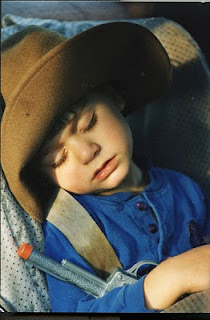My children chide me for choking up over a print review for Toy Story 3. I saw the movie at a preview this week, a feat of emotional fortitude given my son's high school graduation the day before. In the Pixar masterpiece, Andy, the boy to whom the dozen toys are eternally dedicated, empties his room for his move to college. Wait while I clear a tear.
But the review captured why this film is not only a visual achievement (especially in 3D as I saw it) but a dramatic one: the emotional complexity expressed by its animated characters abuts reality.
The line that broke me in Joe Morgenstern's Wall Street Journal
review was parenthetical, but capsulizes the loss my own son's graduation represents: "The production is strewn with visual and verbal zingers, along with silent moments of great eloquence. (As a young man about to go out into the world, Andy takes Woody and Buzz from his toy box for one last time and, gazing fondly at them, relinquishes his childhood.)"
Relinquishes his childhood. I hardly admit I've relinquished
mine, but I certainly don't want to let go of my children's. Their childhoods were not only happy, but made
me happy. My children as adults are people I respect, who I enjoy, but never again include the flights of imagination that Andy (John Morris), and in Toy Story 3, little Bonnie (Emily Hahn) create with their toys. My son's own Buzz Lightyear and Woody were
his favorites. I must've heard "There's a snake in my boot!" hundreds of times. My son even prized a felt cowboy hat that he wore incessantly, just like Woody's.
My children think it bizarre that I'm so sentimental. But on the other hand, like Andy, they refuse to part with their dearest childhood toys. In the film, Andy's mom insists he sort the playthings in his long-untouched toybox into piles earmarked for a nearby preschool, the attic, or college. In determining the toys' ultimate fate, issues of loyalty, emotional wounds, separation and death receive attention with great sensitivity, seamlessly woven into some of the most breathtaking and innovative scenes and angles on screen.
The night before the screening, at graduation, my husband and I were treated to a different film, a collage of my son's high school class, which included not only highlights from their four years together, but a baby snapshot and current photo of each of the 26 students. The music for the video had been recorded on multiple tracks in my son's bedroom--his voice singing Vitamin C's "Graduation Song" accompanied by his strums on ukulele.
Part of the emotion is the parting of the generations. I shared my children's childhoods, but I can't share their adulthoods. These kids not only have Toy Story to remember the past, but they've got their own playlists, hard-drives of photos, Facebook pages, You Tube channels and all sorts of other permanent record of every moment and whim of their present lives. They manage their own images, presenting their persona to hundreds of "friends" in an instant (but of course they won't "friend" me!).
Nowadays, expectant parents create websites to showcase their ultrasounds--and from then on, endless documentation of every burp and giggle is available for anyone to click. This not only stamps each baby with his own sense of importance--which may or may not be a good thing--but it preserves for today's kids their own lives, readily available for re-living anytime.
I've got a few faded photos from my childhood, but not much, really. I didn't even get a digital camera until 2003, when our children were 16, 14 and 11. On the other hand, how many reminders that those lively little children are now just shadows do I really
want ?
Perhaps the charm of all three Toy Story movies is that certain classic joys of childhood remain consistent. Mr. Potato Head, slinky dog, Barbie and the etch-a-sketch were primo Boomer toys that survived to link generations. Now Woody, Buzz Lightyear and the three little green aliens will link today's graduates with their own children. In TS3, even the toys have computer expertise, surreptitiously using Mapquest to find their location. Technology will change, but imagination and creativity continue.
Somehow, though, it's better being on the other side of the generation gap, with the thrill of reaching for a future still ahead of you. The parental view is a vicarious one, desperately wishing the best for the ones to whom you've unreservedly given your heart, but sadly being unable to shape the future the way a mom determines and smooths life for her youngsters.
"Es la vida," shrugs a good friend--that's life. But when you see Toy Story 3, you'll be transported to those magic years when you just
knew that toys came alive when you went to sleep. And even the toys in the attic are waiting patiently for childhood to return.









